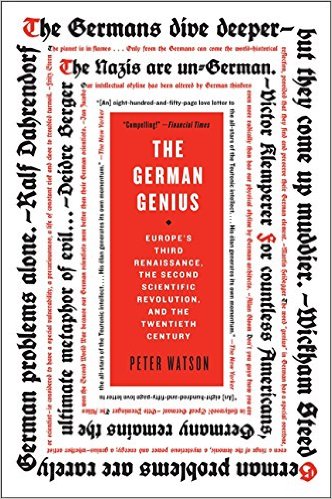I’m re-reading Peter Watson’s The German Genius: Europe’s Third Renaissance, the Second Scientific Revolution, and the Twentieth Century (Harper Perennial, 2011). It’s a powerful history of the intellectually most powerful nation in Europe in the last three centuries.
Watson introduces his theme and its scope this way:

Between the publication of Johann Joachim Winckelmann’s groundbreaking Geschichte der Kunst des Altertums (History of the Art of Antiquity), in 1754, and the award of the Nobel Prize for Physics to Erwin Schrödinger in 1933, Germany went from being the poor relation among Western countries, intellectually speaking, to the dominant force — more influential in the realm of ideas than France or Britain, or Italy or the Netherlands, more so even than the United States.
(p. 30)
Watson’s choice of beginning and ending dates (1754-1933) is arresting, as is his selecting an art historian and a physicist to represent the great range of German intellectual prowess. For the range of impactful of German ideas — in mathematics, chemistry, biology, music, history, economics, and, of course philosophy and politics — has been wide.
Other figures could be chosen to represent 1754 and 1933. From my way of thinking, for example:
In 1754, a 30-year-old Immanuel Kant returned to Königsberg and became a lecturer at the university the following year. And in 1933, Germany got a new chancellor.
Kant and the philosophers, as well as Hitler and the political activists, are also part of Watson’s story — and an important one also for those of us who want to understand not just Germany but the West. As Watson puts it provocatively:
The United States and Great Britain may speak English but, more than they know, they *think* German.
(p. 37)
Indeed, as I’ve argued.
Book looks interesting, but I’m not ready to take out a new mortgage to buy it.
Changed the link to the the paperback edition, DJF. Maybe you won’t need the mortgage now.
Thanks